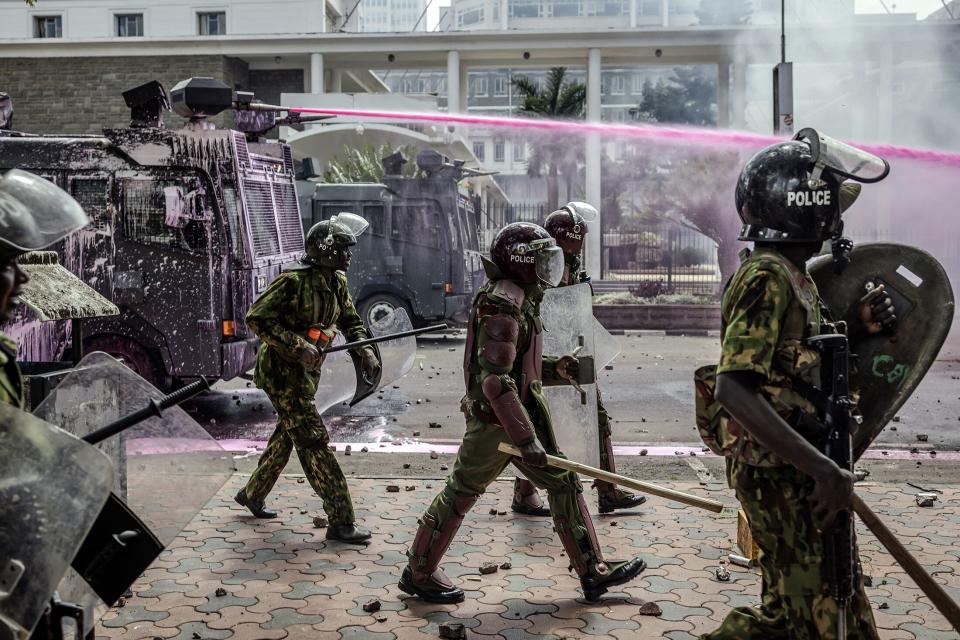Kenyan President Deploys Army to Halt ‘Treasonous’ Protests

(Bloomberg) -- Kenyan President William Ruto slammed the nationwide anti-government protests that have left a least 17 people dead amid a brutal police crackdown, calling it “treasonous” and deployed the military to end the agitation.
Most Read from Bloomberg
YouTuber Dr Disrespect Was Allegedly Kicked Off Twitch for Messaging Minor
Volkswagen Invests $5 Billion in EV Startup Rivian to Form Joint Venture
Nvidia Rout Takes Breather as Traders Scour Charts for Support
A $100 Billion Bet on China’s Economy Sours as Warehouses Empty
The demonstrations were sparked by Ruto’s plan to push through a raft of unpopular taxes to generate an additional 302 billion shillings ($2.3 billion) in the budget year that begins on July 1. Protesters are demanding that lawmakers — who passed the bill on Tuesday after dropping some of the more contentious levies such as a 16% tax on bread — scrap the entire plan.
Listen to our X Spaces discussion on the protests
Most of the protesters are young Kenyans in their 20s and 30s and have been mobilizing on social media platforms. While past anti-government marches were mostly organized by opposition politicians, the current rallies seem to be organic and largely peaceful — but they have been met by police firing live rounds, tear gas and powerful water cannons.
The government “shall treat every threat to national security and the integrity of our state as an existential danger to our republic,” Ruto said in a televised address on Tuesday night. “Accordingly, I assure Kenyans that we shall provide a full, effective and expeditious response to today’s treasonous events.”
UN Secretary-General Antonio Guterres was “deeply concerned” about the violence and reported cases of arbitrary detentions, according to an emailed statement. He urged Kenyan authorities to exercise restraint and called for all demonstrations to take place peacefully.
The government proposed the new taxes to improve state finances, address its high debt ratio and access more International Monetary Fund financing. While the planned measures helped the shilling become the world’s best-performing currency this year, they also triggered protests by residents struggling with rising food prices and a youth unemployment rate that the Federation of Kenya Employers puts at as high as 67%.
Death Toll
At least 17 died in the demonstrations across 28 counties, according to a tally by human rights group Independent Medico-Legal Unit by 5 p.m. Tuesday. About 53 people were arrested and 22 others are missing, it said in a statement.
At Kenyatta National Hospital near the site of the main protests in Nairobi, 160 people were admitted with various degrees of injuries including fractures and bullet wounds on Tuesday, according to a hospital administrator, who spoke on the condition of anonymity to avoid government reprisals. At least two men were brought to the hospital already dead.
Ruto’s defiant speech, in which he expressed regrets about the “loss of life,” took many observers by surprise. No act of treason was committed, according to Julius Njoroge, a constitutional lawyer.
“He took it as an act of aggression,” he said, referring to Ruto. “It was just people expressing their opinion, though it got out of hand. It wasn’t people betraying the country.”
Funding Shortfall
Kenyan Treasury Secretary Njuguna Ndung’u said last week the government’s move to row back on some of the levies will create a 200 billion-shilling shortfall in government finances. The IMF, which helps countries with balance of payments deficits, often recommends austerity measures to fix the fundamentals of economies, which often amounts to acute short-term pain as the price for longer-term stability.
The IMF has declined to comment since the protests erupted last week.
Sign up here for the twice-weekly Next Africa newsletter
For decades, the IMF’s measures have made it a lightning rod for criticism from restless citizens in countries turning to the crisis lender for money. Governments pushing through austerity measures such as spending cuts and subsidy withdrawal have often clashed with protesters, with the results including violence and the toppling of administrations.
In Indonesia, the withdrawal of subsidies on fuel and food at the urging of the IMF in 1998 led to a revolt that forced dictator Suharto from power. Discontent with the IMF in Argentina in 2001 led to both deaths and the president’s resignation. Protests against an IMF loan to Morocco in the early 1980s led to the burning of banks and confrontations with police that killed hundreds.
In Kenya, hundreds of protesters overran parliament buildings on Tuesday moments after legislators passed the unpopular tax measures. Ruto then has 14 days to sign the revised measures, or ask parliament for more changes.
To fill the gap created by the concessions, lawmakers approved an amendment to increase an import tax, the proceeds of which help to finance the operations of a Chinese-built railway. A new proposal will be introduced to increase a fuel levy by 39%.
The Treasury may also resort to borrowing more or introducing other tax measures. The nation’s debt — equivalent to about 67% of GDP — is at high risk of distress, according to the IMF.
Under an IMF program agreed in 2021, Kenya committed to borrow less, slash government spending and boost revenue collection. That has made the Washington-based lender an unlikely villain of the protests, where its name is plastered on posters and denounced by angry crowds.
You can follow Bloomberg’s reporting on Africa on WhatsApp. Sign up here.
--With assistance from Eric Martin.
(Updates with death toll and details throughout)
Most Read from Bloomberg Businessweek
How Jeff Yass Became One of the Most Influential Billionaires in the 2024 Election
Why BYD’s Wang Chuanfu Could Be China’s Version of Henry Ford
Independence Without Accountability: The Fed’s Great Inflation Fail
©2024 Bloomberg L.P.

 Yahoo Finance
Yahoo Finance 